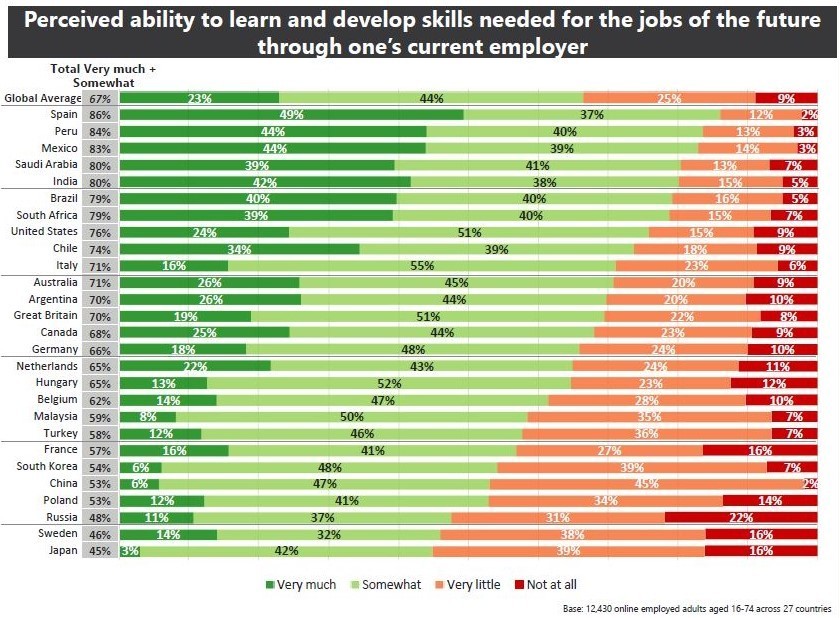At least half of people who have a job fear they'll lose it in the next 12 months

Job losses are a concern for more than half of working adults.
Image: Photo by LYCS Architecture on Unsplash
Stay up to date:
Future of Work
- New survey shows more than half of working adults fear for their jobs.
- But two thirds of workers are optimistic about retraining on the current job.
- Employment concerns and perceived opportunities to learn new skills vary greatly between countries.
A new Ipsos survey, conducted on behalf of the World Economic Forum, shows that more than half (54%) of working adults fear for their jobs in the next 12 months. However, these workers are outnumbered by those who think their employers will help them retrain on the current job for the jobs of the future (67%).
The size of the gap between optimism about reskilling and pessimism about job losses depends on where you live.
The COVID-19 crisis has accelerated trends towards automation and the use of artificial intelligence. Jobs will certainly go – but new ones that require different skills are emerging.
In parallel, governments are considering the longer-term labour market implications of maintaining, withdrawing or partly continuing the strong crisis support they are providing to businesses to cover wages and maintain jobs.
The result, is a disrupted labour market and uncertain prospects for 2021.
Fear of job losses
The survey of 12,000 employed adults from 27 countries finds that of the 54% who are concerned, 17% are “very concerned” and 37% “somewhat concerned” about losing their job.
Job-loss concern in the next year ranges from 75% in Russia, 73% in Spain, and 71% in Malaysia, to just 26% in Germany, 30% in Sweden, and 36% in the Netherlands and the United States.

Prospects to train on the job
The survey also finds that two thirds of employed adults say they can learn and develop skills needed for the jobs of the future through their current employer: 23% are “very much able” to do so, and 44% “somewhat able”.
Across the 27 countries, the perceived ability to learn and develop those skills on the job is most widespread in Spain (86%), Peru (84%), and Mexico (83%) and least common in Japan (45%), Sweden (46%), and Russia (48%).

From job-loss pessimism to reskilling optimism
The countries where those who can gain new skills on the job outnumber those who are concerned about losing their job by the largest margins are the United States and Germany (by 40 percentage points).
In reverse, job loss concern is more prevalent than perceived ability to acquire skills in Russia (by 28 points) and, to a lesser extent in Malaysia, Poland, Japan, Turkey, and South Korea.

A reskilling revolution?
The forthcoming World Economic Forum 2020 Future of Jobs report will reveal how employers are motivated to support workers who are displaced from their current roles, and plan to transition many of those workers from their current jobs into emerging opportunities.
What is the World Economic Forum’s Jobs Reset Summit?
Rather than narrowly focusing on short-term savings from layoffs or automation, therefore, businesses that invest in human capital will find that there is a compelling financial and nonfinancial business case to reskill at-risk workers.
An earlier report by the World Economic Forum suggests that human capital is a crucial asset of any business. It highlights how in an age of ubiquitous technology, it is human skills, creativity and capability that will form the competitive edge for any organization. Financing and implementing a “reskilling revolution” is a critical investment for business, workers and economies alike.
Don't miss any update on this topic
Create a free account and access your personalized content collection with our latest publications and analyses.
License and Republishing
World Economic Forum articles may be republished in accordance with the Creative Commons Attribution-NonCommercial-NoDerivatives 4.0 International Public License, and in accordance with our Terms of Use.
The views expressed in this article are those of the author alone and not the World Economic Forum.
Forum Stories newsletter
Bringing you weekly curated insights and analysis on the global issues that matter.
More on Forum InstitutionalSee all
World Economic Forum
May 16, 2025
Victoria Masterson, Stephen Hall and Madeleine North
March 25, 2025
Lorez Qehaja
March 19, 2025





